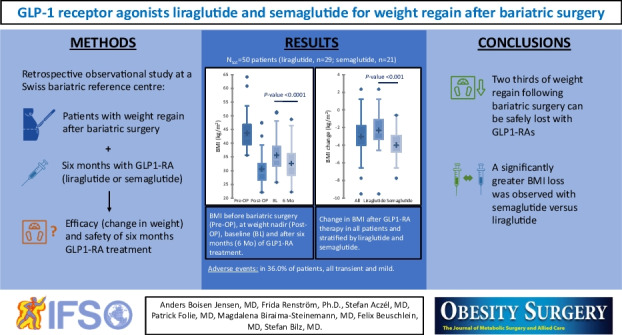Semaglutide After Bariatric Surgery: Does It Make Sense?
There’s been a lot of recent publicity and promise on social media and the news about new weight loss drugs with results that sound too good to be true. Celebrities and influencers have touted the benefits of medications like Ozempic and Rybelsus as a simple solution to help them lose weight.
Is semaglutide a game-changer for those struggling to lose weight? There’s more to the story, and medications like semaglutide might not be for everyone. It’s important to understand that there is no “quick fix” for weight loss. Only a handful of solutions have been proven to cause significant and permanent results for those struggling with obesity.
Semaglutide After Bariatric Surgery: The Quick Answer
When can you resume semaglutide after surgery? You should talk to your doctor about suitable methods to safely lose weight. Exercise, diet, and medications (if any) should be tailored to your specific needs.
It’s important to remember that semaglutide can be a useful tool for some patients to keep excess weight off, but can result in unexpected side effects. Certain patient populations may also see more benefits from adding this medication than others.
Do Weight Loss Surgery and Semaglutide Pair Well Together?
So far, the results are promising when adding a medication like semaglutide to a bariatric surgery patient’s routine. The medication may be extremely beneficial in a small subset of bariatric surgery patients who regain weight, even after they’ve lost it. The medication may also help patients who don’t lose weight as fast as they should.

If you’re considering bariatric surgery and are concerned about regaining weight or are not losing as much as you’d like to, speak with a surgeon from ALO Bariatrics today to see what options you have in obtaining your desired results.
How Semaglutide Works
Semaglutide works through a few different mechanisms. One is by tricking your brain into thinking that you’ve just eaten. The medication acts similarly to a naturally occurring hormone called glucagon-like-peptide-1, or GLP-1. Once injected or swallowed, the medication binds to receptors that help send signals to your brain to feel full and satisfied. As a result, you’ll feel fuller faster and for longer. This will help prevent food cravings and overeating.
Another way that semaglutide works is by slowing down intestinal motility. The food you eat will take longer to travel through your digestive system. Slowing down motility also helps decrease hormones that make you hungry and trigger big appetites.
Slower motility also means semaglutide and other GLP-1 agonists can help decrease spikes in blood sugar. When food moves slowly through your digestive system, your blood sugar increases at a slower rate, and insulin is released from the pancreas to compensate and lower your blood sugar. When people eat substantial amounts of food quickly, the food can travel fast through the digestive system and cause a large spike in blood sugar. The pancreas can’t keep up releasing the necessary amount of insulin.
One of the more intriguing ways semaglutide works is by inhibiting a reward pathway in your brain. This reward pathway releases “feel-good” neurotransmitters (chemicals) in your brain when you eat. Dopamine and serotonin are released so that you get a sense of pleasure when eating. When you take a medication like semaglutide, this reward pathway is inhibited, so you will lose that “rewarding” feeling when you eat or overeat.
Overall, the medication leads to a reduction in your total daily calorie intake. When your body is burning more calories than it’s taking in, it uses fat as a source of energy, and you’ll lose weight.
Semaglutide After Bariatric Surgery
Semaglutide or another GLP-1 agonist can be used after surgery in some patients. The medication may be useful for helping you change your eating habits, preventing your weight loss from “stalling” out, and keeping you from regaining the weight you’ve lost. Studies have also shown beneficial effects on conditions like diabetes and cardiovascular disease in some patients.
Bariatric surgery has been shown to help people lose substantial amounts of weight. However, semaglutide isn’t a substitute for bariatric surgery.
Ozempic vs. Saxenda
Multiple products are on the market that work like semaglutide or are semaglutide and available as a name brand product. Saxenda is the brand name of a medication called liraglutide. Liraglutide is among one of the many GLP-1 agonists used for diabetes and weight loss.
All of the GLP-a agonists work similarly to help you lose weight. You’ll want to keep in mind which medication will fit best into your lifestyle and compare and contrast the dosing requirements and side effects.
Some medications are taken with a subcutaneous injection, which is given just under the skin (like insulin). The injectable medications are available in a once-weekly or once-monthly dose. There is also an oral formulation you can take daily.
Clinical Evidence
Weight loss drugs like semaglutide are relatively new for weight loss, so the results of new research are coming out daily. In one of the more recent studies, researchers looked at the effect of once-weekly semaglutide in overweight patients and compared that to a group that received a placebo.
The results of the study showed that 86.4% lost more than 5% of their weight, 69.1% of the patients lost 10% of their weight or more, and 50% of the patients lost 15% or more. This study showed that semaglutide is indeed effective at helping support substantial weight loss for overweight patients.
Pros & Cons of Using Semaglutide After Bariatric Surgery
No medication is without side effects, and there are always pros and cons to consider when making a change to your lifestyle, like adding medication. While the long-term side effects of medications like semaglutide aren’t currently clear, here are some of the most common side effects that have been reported from patients on GLP-1 agonists.
- Abdominal pain
- Constipation
- Diarrhea
- Nausea
- Fatigue
- Headache
Less common side effects include:
- Low blood pressure
- Hair loss
- Liver damage
- Anxiety
- Fast heart rate
Some of the most serious reported side effects are:
- Kidney damage
- Nerve damage
- Gallbladder disease
- Severe allergic reactions
- Thyroid cancer
- Pancreatitis
Your side effects will be unique to your case. Not everyone experiences the same side effects, and sometimes patients don’t experience any. Speak with a surgeon from ALO Bariatrics today about which side effects you’re worried about and if there are any steps you can take to help lessen the chances of them occurring.
Speak to the Bariatric Experts at ALO
If you’re contemplating the next steps in tackling your weight problems, speak with a board-certified bariatric surgeon from ALO Bariatrics today. Our experienced bariatric surgeons have extensive knowledge of what it takes to lose weight and to keep it off. Having performed thousands of successful bariatric surgeries, our team is no stranger to helping people reach their desired weight loss goals.
With three convenient locations across Mexico, it has never been easier to travel and receive quality, safe, and affordable care from the best in the business. We operate out of state-of-the-art facilities in Guadalajara, Tijuana, and Puerto Vallarta. Our facilities are held to the highest quality and safety standards for our patients.
Reach out today and schedule a consultation to talk with a bariatric surgeon. We take a team approach to caring for our patients and develop a weight loss plan designed to meet your goals.


